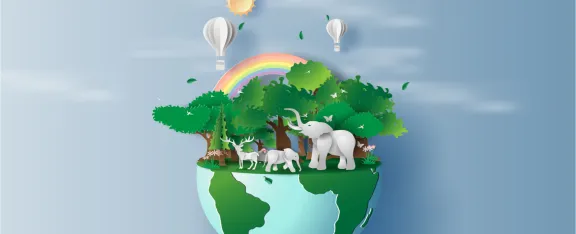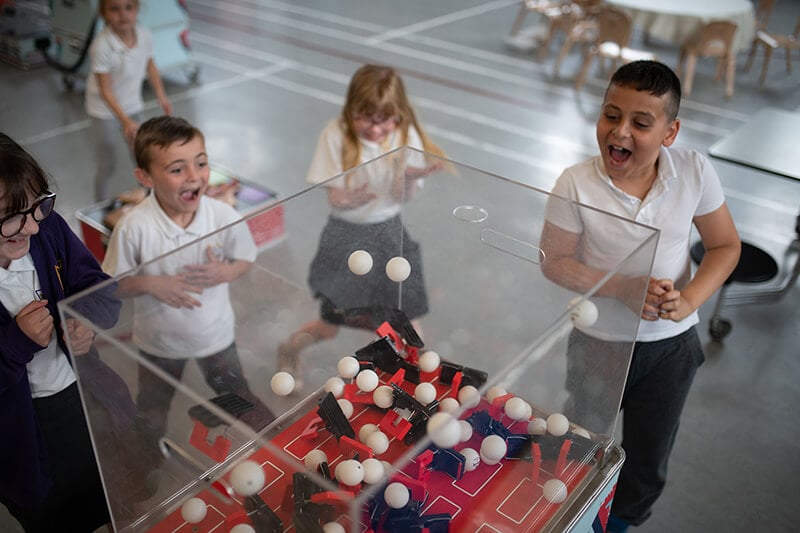Happy International Earth Day!
On Earth Day, 2021, we celebrate the wonderful planet that we live on and explore the innovative ways we’re helping to preserve our future on this planet.
Approximately 4.5 billion years ago, bits of rock and space dust formed together to create planet Earth and has been home to Homo sapiens (humans) for approximately the past 300,000 years. In the time that humans have walked on Earth we've evolved significantly, developing innovative technologies that have helped us solve some of the most difficult problems.
The Industrial Revolution of the 18th Century saw one of the most significant increases in technological advances. These advancements were the:
- Use of materials like iron and steel
- Use of new energy sources, burning of fossil fuels like coal, natural gas and oil
- Invention of new machines like the power loom
- Introduction of factories which was a new way of working
- Evolvement of transportation and communication
- Increase of applying science to industry
As a result of the evolving industry, workers acquired new skills - rather than craftspeople working with their hands, they developed skills in operating and repairing machinery. This type of reskilling in the workforce is evident today.
Whilst the Industrial Revolution represents one of the greatest leaps in human advancement and has allowed us to thrive on Earth, we now know that it began the process of human-induced climate change as early as the 1830s.
Today in the 21st century, we continue to develop technology and invent machinery to assist in our daily lives. We develop technology to create vaccinations to viruses, to help restore mobility to people through the use of prosthestics and mobility scooters, and to re-think how we grow crops sustainably. Our society now looks to innovation to help us develop technology whilst taking the environment into consideration.
Click the sections below to learn more about our wonderful planet and join us as we celebrate Earth Day.
Glasgow Science Centre's new permanent exhibition, Idea No59 celebrates the innovative spirit in us all. On your next visit, come and explore the exciting process of taking ideas and bringing them to life. You can also get hands-on with a range of engaging energy themed exhibits at our Powering the Future exhibition.
Resources:
Tour of the Earth
To start off our Earth Day celebrations, let's join Veronica as she takes us on a tour of the planet we call home- Earth! Discover the elements which make up our atmosphere and the special ingredients only Earth is known to have for life to exist.
#GSCAtHome Activities
Why not continue your celebration of Earth Day by trying out some of your own science experiments at home? Our #GSCAtHome science activities include making your own tornado, volcano and rainbow, creating tree art and your own terrarium and discovering the beauty of Millipedes and the Fibonacci Sequence.
Spark Magazine & Radio
Welcome to The Spark and a Spark of Science- an exciting, new magazine and community radio podcast from Glasgow Science Centre!
Each issue has exciting experiments for you to try at home, fascinating facts to ponder over, and puzzles and quizzes to challenge your family.
In the first issue of The Spark, we are looking at Space, Volcanoes and Minibeasts. So from the very big, to the very small. Do you think there are any minibeasts in space? Download your free PDF copy!
In this edition, our activities are linked to the natural environment. Our planet is constantly undergoing transformation, with the changing seasons, with the weather, but also through the actions of humans. What changes do you see in your natural environment? We’ll be making a miniature garden in a jar and finding out how Earth recycles water through our land, oceans and skies. We’re also collecting colourful autumn leaves to make beautiful pieces of art, and we meet Heather Stewart, who studies changes in the Earth at the bottom of the sea.
In this special Earth Day edition of 'A Spark of Science', take a dive as we explore how we use a resource that covers 71% of planet Earth- Water!
A Spark of Science: Why is the Sky Blue?
In this episode of 'A Spark of Science', we launch into the atmosphere to discover why the sky is blue!
Climate Challenge Campaign
We have teamed up with eco-warrior and social media influencer @LessWasteLaura on the exciting Climate Challenges campaign.
Laura is an eco-warrior, zero waste advocate, environmental activist, and ethical influencer. Laura has a passion for the environment and everything which dwells in it, which she advocates for on social media under the name Less Waste Laura. Having just completed her masters in environmental protection and management, she is now spending her time split between working for the international development organisation Tearfund, and running her online platform.

Community Climate Champion
Climate Champions are all around us, working hard to make positive changes in their communities. As part of our celebration of Earth Day, we want to highlight a local Climate Champion who has been creating her own YouTube video’s to explain Global Warming, Climate Change and the upcoming COP26 conference.
Name: Para’a
School: St Mungo’s Primary School
Year Level: Primary 7
What made you interested in learning more about Science and Climate Change?
What made me interested more in science and climate change was that my school had actually taken part in the GSC learning lab activities during lockdown which made me think more about what we can do to help our earth and encouraged me to learn more.
Why do you think it is important for us to take action on Climate Change?
I think it is important that we take action in climate change because climate change is caused by human activities and is threatening the way we live and the future of our planet , so if we all help we can make this a sustainable world for everyone.
What are you hoping the future is going to look like?
I am hoping the future to look like as to have more electric cars to stop fossil fuels burning and to have more trees planted in the trees that are being cut downs place to stop deforestation and to stop animals homes to get destroyed.
{"preview_thumbnail":"/sites/default/files/styles/video_embed_wysiwyg_preview/public/video_thumbnails/ju4lQok2zDc.jpg?itok=HlHwJiLQ","video_url":"https://www.youtube.com/watch?v=ju4lQok2zDc","settings":{"responsive":true,"width":"854","height":"480","autoplay":false},"settings_summary":["Embedded Video (Responsive)."]}
Glasgow Science Centre will host the official public engagement, or green zone for COP 26, to keep up to date with our events programme check out our What's On section.




